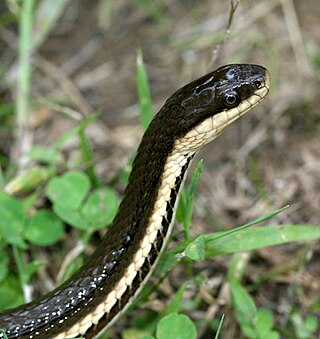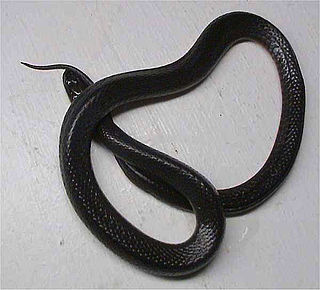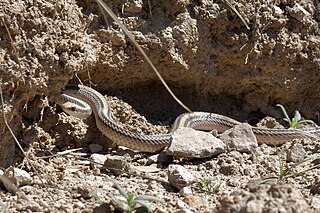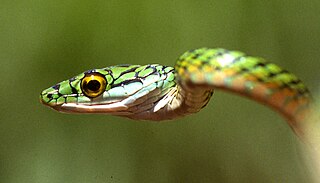
Garter snake is the common name for small to medium-sized snakes belonging to the genus Thamnophis in the family Colubridae. Native to North and Central America, species in the genus Thamnophis can be found in all of the lower 48 United States, and nearly all of the Canadian provinces south of the Northwest Territories and Nunavut—with the exception of Newfoundland and Labrador. They are found from the subarctic plains of west-central Canada east through Ontario and Quebec; from the Maritime Provinces and south to Florida, across the southern and central U.S. into the arid regions of the southwest and Mexico, Guatemala and south to the neotropics and Costa Rica.

The queen snake is a species of nonvenomous semiaquatic snake, a member of the subfamily Natricinae of the family Colubridae. The species is endemic to North America.

The black swamp snake is a species of snake in the subfamily Natricinae of the family Colubridae. The species is endemic to the southeastern United States. There are three subspecies, including the nominotypical subspecies.

The long-nosed snake is a species of nonvenomous snake in the family Colubridae. The species is endemic to North America. It has two recognized subspecies. The other species in the genus were previously considered subspecies.

Masticophis is a genus of colubrid snakes, commonly referred to as whip snakes or coachwhips, which are endemic to the Americas. They are characterized by having a long, thin body and are not dangerous to humans.

Nerodia is a genus of nonvenomous colubrid snakes commonly referred to as water snakes due to their aquatic behavior. The genus includes nine species, all native to North America. Five of the species have recognized subspecies.

Salvadora is a genus of colubrid snakes commonly called patchnose snakes or patch-nosed snakes, which are endemic to the western United States and Mexico. They are characterized by having a distinctive scale on the tip of the snout.

Tantilla is a large genus of harmless New World snakes in the family Colubridae. The genus includes 66 species, which are commonly known as centipede snakes, black-headed snakes, and flathead snakes.

Cemophora coccinea, commonly known as the scarlet snake, is a species of nonvenomous snake in the family Colubridae. The species is native to the southeastern United States. There are two subspecies of C. coccinea that are recognized as being valid. The Texas scarlet snake was previously considered a subspecies.

Storeria is a genus of snakes in the subfamily Natricinae of the family Colubridae. The genus is endemic to North America and Central America. The genus consists of five species, four of which are known as brown snakes, and one of which is known as the redbelly snake.

The Natricinae are a subfamily of colubroid snakes, sometimes referred to as a family (Natricidae). The subfamily comprises 36 genera. Members include many very common snake species, such as the European grass snakes, and the North American water snakes and garter snakes. Some Old World members of the subfamily are known as keelbacks, because their dorsal scales exhibit strong keeling.

Regina is a genus of semiaquatic natricine colubrid snakes known as crayfish snakes, named after their primary choice of diet. The genus consists of two species which are found in the eastern and central United States.

Regina grahamii, commonly known as Graham's crayfish snake, is a species of nonvenomous semiaquatic snake in the subfamily Natricinae of the family Colubridae. The species is endemic to the central United States.
The glossy crayfish snake is a subspecies of nonvenomous snake endemic to the southeastern United States. Its scientific name, rigida, derives from the fact that it is comparatively stiff.

The crayfish snake, also known commonly as the glossy crayfish snake, the glossy swampsnake, the glossy water snake, and the striped water snake, is a species of semiaquatic snake in the subfamily Natricinae of the family Colubridae. The species is endemic to the southeastern United States, and preys mainly on crayfish.
The striped crayfish snake is a species of semiaquatic North American snake in the family Colubridae. The species derives its common name from its principal prey, crayfish. This snake is also called Allen's snake, the striped swamp snake, the striped swampsnake, or simply the swamp snake. It is endemic to peninsular Florida. Although rarely seen due to its secretive behavior, it can be found in large numbers in wet areas, with densities approaching 1,300 snakes per hectare.

Salvadora hexalepis, the western patch-nosed snake, is a species of non-venomous colubrid snake, which is endemic to the southwestern United States and northern Mexico.

Leptophis is a genus of colubrid snakes, commonly known as parrot snakes. The species within this genus are widely distributed throughout Mexico, Central and South America.
Trimetopon is a genus of snakes in the family Colubridae. The genus is native to Costa Rica and Panama. Species in the genus Trimetopon are known commonly as tropical ground snakes.

Zygaspis is a genus of amphisbaenians in the family Amphisbaenidae. Species in the genus are commonly known as purple round-headed worm lizards, and are native to equatorial and southern Africa.
















